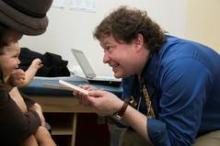Pediatricians can sometimes feel like frustrated lifeguards, Dr Andrew Garner mused.
"We hear someone drowning and jump in to help them. And then we hear another and another, and keep jumping in over and over again to pull them out. But maybe what we really need to do is swim upstream, find out why people keep falling in, and fix that."
In an interview, Dr. Garner discussed the effects of chronic, unremitting stress, which, he said, can destroy a child’s potential for lifelong health.
Physical problems like cardiovascular disease, obesity, diabetes, cancer, and even dementia have been directly linked to chronic childhood stress.
However, stress isn’t always a bad thing, said Dr. Garner, lead author of an American Academy of Pediatrics technical paper on the enduring effects of early childhood adversity (Pediatrics 2012;129:e232-46). Stress can be a teacher instead of an attacker. Stressful changes in an infant’s environment, for example, trigger the responses that very quickly teach a baby how to get what she needs.
"The only way a young baby can be nurtured is by an outside force. But that’s the beginning of affect regulation. The first social smile is a great example. When that infant realizes, ‘Every time I smile and coo, mom’s face is there,’ then he’ll get the attention he needs by smiling and cooing." Thus, the first link between adversity and positive coping is formed.
"Positive stress is adversity that is brief, and shut off by social and emotional buffers," like responsive caregivers, said Dr. Garner, a pediatrician in Westlake, Ohio. "It builds motivation, resiliency, and competency."
Toxic stress, however, can’t be turned off. There’s nothing to buffer its impact – no grown-up to absorb its power and reassure a child that the world hasn’t really turned upside down. The situation is almost always the result of a dysfunctional environment: prolonged economic hardship or a caregiver affected by depression, substance abuse, violence, or sexual abuse – perhaps related to her own childhood experiences.
In an ongoing situation like that, a child’s physical stress response never really turns off. "Allostatic loading is always being pushed, making it harder and harder for the body to recover," and very difficult to return to a normal physiologic baseline, Dr. Garner said.
There’s now little doubt that toxic stress can set a child on a lifelong rocky road. In addition to the physical problems that have been directly linked to chronic childhood stress, mental health can suffer as well, according to Terrie Moffitt, Ph.D. Her recent paper examined the relationship between lifelong health and exposure to another kind of toxic stress – exposure to violence (Dev. Psychopathol. 2013;25:1619-34).
"Taken together, the evidence shows that childhood violence victimization is associated with the risk for many different kinds of psychiatric illness, comorbidity, unfavorable course of illness, and poor treatment response," wrote Dr. Moffitt, the Knut Schmidt Nielsen Professor of Psychology and Neuroscience at Duke University, Durham, N.C. "It is difficult to identify a disorder to which childhood victimization is not linked." The list includes disorders of mood, anxiety, behavior, and substance abuse. Recent studies have even linked violence exposure to significant declines in adult IQ, she noted.
There is also now very good human neuroimaging evidence that chronic stress in childhood is directly related to physical changes in the developing brain, including the hippocampus, amygdala, striatum, prefrontal cortex, orbitofrontal cortex, and anterior cingulate gyrus (Front. Hum. Neurosci. 2012;6:52-130).
Emerging research is uncovering the pathophysiology that links toxic childhood stress and poor adult health. Perhaps most familiar is the effect of chronic inflammation. Inflammatory cytokines released during stress response prepare the body to meet an immediate physical threat. But over years, those proteins damage tissues, increasing the risk for disease. More recent findings center on genetic changes – like the erosion of the DNA telomeres, leading to impaired cellular replication – and epigenetic changes – like DNA methylation and histone acetylation – that determine which genes are turned off or on,
But although there’s abundant evidence of long-term damage from toxic stress, there is also evidence that a stressful environment doesn’t necessarily doom any child, said Dr. Garner. "There is plenty of research showing that a dependable, nurturing relationship can mitigate some of the effects."
A 2013 study from the United Kingdom is an example. It included 1,116 families who had participated in the Environmental Risk Longitudinal Twin Study (E-Risk). It assessed the mothers’ childhood history of any maltreatment, and any reports of physical maltreatment of the children enrolled. The researchers compared families in which mothers, but not children, had experienced maltreatment with families in which both mothers and children had experienced it, and also with families without maltreatment (J. Adolesc. Health 2013;53 (suppl.):S4-10).


